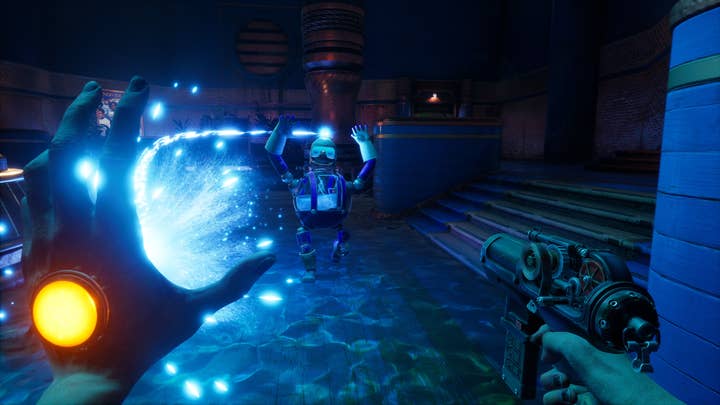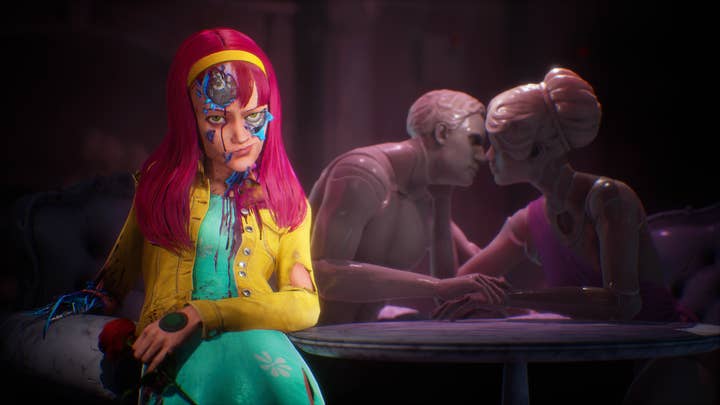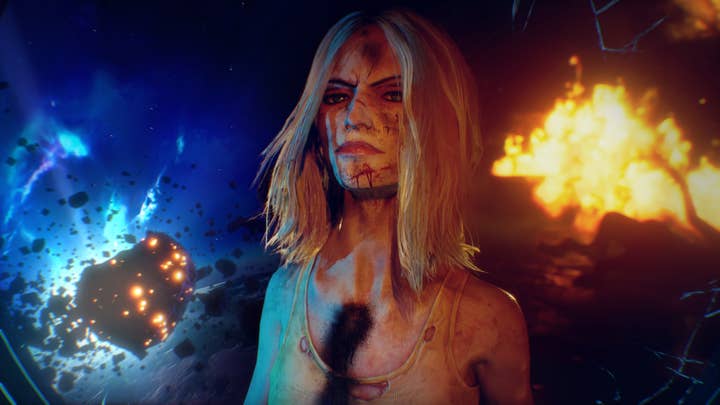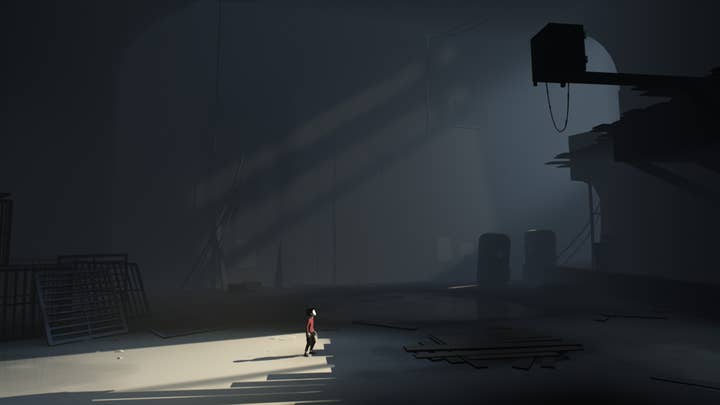The future of storytelling with Ken Levine
Acclaimed developer also discusses Judas, generative AI and why it "wasn't easy to step away from BioShock"
Ken Levine has spent much of his career trying to redefine video game narratives. Most famously with the iconic twists in his acclaimed BioShock series, and most recently with the ongoing development of Judas – the debut title from Ghost Story Games.
While some may argue that video games as a medium may be reaching their limit in terms of graphics and production quality, the potential for interactive storytelling remains largely untapped. Judas attempts to explore this by mixing up the story's events depending on the relationship players develop with key characters, but Levine is keen to emphasise this is just one possible future of narratives in video games.
We spoke with the renowned designer about the biggest challenges in telling stories that react to players, the balance between author vision and player agency, the potential for generative AI in storytelling, and more.
The interview below has been edited for brevity and clarity.
Video game storytelling has advanced so much in the last decade or so, but what would you say is the biggest challenge that remains?
It's very easy to show a player a story. The harder part is to get them to participate in it and react to how they participate.
It wasn't easy to step away from BioShock, but I saw an opportunity to take on some risk creating a new IP
I don't think there's one way to make games, but personally, as a narrative games maker, I've never been a big fan of cutscenes because they're not interactive. One of the reasons Judas is taking so long is trying to figure out how we get the game to be substantially more responsive to player decisions. That's a really hard problem, and that's why you don't see a ton of it [in games].
Our industry is over 50 years old and we still don't really know what it is, what games are. By the time movies were 50 years old, they were making Citizen Kane. It's changed somewhat [since then], styles have changed, but they had it pretty well figured out by the 1940s – we haven't.
Now I think that's a feature not a bug because I like being in a field where even at my age, I'm still like 'What is this thing? Let's try shit and see if it works.' That's incredibly exciting.
Is it the interactivity that makes it more difficult? With a film, TV, even a book, everyone is going to experience the story in the same way at the same pace – you have so much more control as a storyteller. Whereas if players have any level of agency, you lose some of that control. How do you balance between the story you want to tell versus the story that the player thinks they are being told or participating in?
In the future, it [will be] player-driven – that's where we want to go. Because that's what makes our medium unique. We have different advantages. You want someone to interact in a movie? Well, good luck. They've tried stupid stuff like the Clue movie back in the day where there's different [endings] and I've seen people try more of this now where they're sort of doing this pseudo-branching thing – it's just so rudimentary that doesn't work.
It's about how you respond to the players' desire to participate, and how you make them feel that their decisions are important. That's validating, and they feel like they've had a different experience than their friend – because otherwise we should just make a movie.

Branching narratives and a lot of interactive movies are locked to the decision tree structure. We recently spoke to the team behind Bridge Command, an immersive Star Trek-style live action bridge simulator, and they can break away from that decision structure because they have live actors who can react and people behind the scenes who can adapt to what the players are doing. But video games have to be programmed to react to players – you have to predict what the players are going to try. How do we overcome that barrier?
Yeah, there's a whole range of interactive theater which is very powerful and they bring because improv, and the ability to react to an audience is very powerful. Interactive theatre is probably the closest thing to what we do, but we don't have human brains that decide in the moment what to do. Computers do not know how to improv.
The approach we're taking with Judas is heavily based upon recognition of player action and response to player action. Even just characters' observing a long range of player action and commenting on it. 'Hey, you saw this and you did that and then you did this and that was interesting because that caused that' – we're doing that kinda stuff right now. And it's really just observing the players and then writing the types of lines that could react to various types of things. It's a huge amount of work because you have to think of all the things a player can do and then write in-character responses for different characters to those actions in a way that feels organic.
Another thing we figured out is that continuity is really important. You can do individual moments like a Madlib, filling in the blank. So, an orc comes to you and puts you on a quest to find X, right? Those just feel very boring and rolled out of a random number generator. But once you start observing sequences of events – having characters observe 'You did this and then you did that and that caused this and I'm mad because it did that' – that's when it gets really interesting. That's the space we've been exploring.
It's a complicated problem and I don't think there's any one way to solve it. What I'm interested in is giving the player more space to explore and then supporting that, rather than just say 'No, you're doing our story. Fuck you.'
Advocates would argue that generative AI is the solution to this. What are your thoughts on that technology and its capability to react to players?
I don't want to underestimate it. I think it's very powerful.
One limitation AI seems to have is persistence. You look at Sora, the ChatGPT video generator, you see a woman walking down the street and the street scene is beautiful – but if she were to turn around and walk backwards, it wouldn't remember where she has been. It doesn't currently understand persistence, although that may change. We can't tell if it's a limitation of just the nature of the technology. So for all the concerns about AI, have you seen it write a good 20-page movie yet? Scene-to-scene? It doesn't know how to do that.
"I don't really believe in authorial intent. One day I'll be dead and if I'm lucky enough that people are still interested [in my games], they're not going to be able to ask what I think."
There are useful elements of AI right now – for instance, training your bug database to query how many bugs you have in certain situations. But what it can't do is tell me a really compelling story that has a three-act structure, or even tell me multiple scenes. It gets extremely confused.
We've not used any generative AI in the development of the product outside of things like bug databases, clearing our analytics database – that's what it's good for. We haven't used it for [concept art] because there's some legal issues around [sourcing images]. Right now I'm not overly impressed when it comes to game development – I'm sure there will be more to it [in future] but I'm not super worried about it yet in a 'it's coming to take everybody's jobs' perspective.

You were saying about giving players a bit more room to explore, but that brings up the challenge of pacing. Does that affect the type of story you can tell? If the main plot is about the world ending imminently, that can be undermined when players spend 20+ hours doing side quests.
It's really funny because we're making this game where the ship is falling apart and you've got to get off. So we think about it all the time because anything you're going to be doing, if it's not about getting off the ship, the big question that will come up is 'Why am I doing this?' and you [risk] the player losing faith in the story you're telling. You have to respect all that stuff.
There's no universal answer except, I guess, don't make problems for yourself. Does the world have to be ending in your story? ln Judas, that is what we bit off, so we have to think about that problem. But you try to align your story with your capacity to tell it. Originally when we started on Judas, we were thinking of a smaller thing and the story was much smaller, but then as our ambitions rose, and the game had to sort of catch up to it in terms of where you're trying to do a story and character.
We've actually never made a game before really where the stakes were this high and that's for a specific reason. This is the problem with Marvel movies: every fucking five minutes, the universe is about to end and eventually that stake can become sort of meaningless. I prefer to avoid that because a player will feel rushed – you want to keep the stakes dramatically high, but you also want to make them feel like they can do what they want to do and explore the environment down to every square inch.
When you're creating a game with multiple endings, what are your thoughts on developer canon versus the player's decision on what the ending is? There's always debate as to which is the true ending of a game, and Ubisoft is trying something with Assassin's Creed Shadows, which will have a 'canon mode' that makes decisions for the players. What impact does that have on the choices made by other players?
I haven't played the game so it may be brilliant and they may have made all the right decisions. At first blush, it sounds to me like, maybe you're doubting yourself a little bit. At the end of the day though, I kind of feel that there is no 'canon'. I don't really believe in authorial intent, because one day I'm going to be dead and if I'm lucky enough that people are still interested [in my games] when I'm gone, they're not going to be able to ask what I think.
"Originally Judas' story was smaller. As our ambitions rose, the game had to catch up"
I really try not to overly insert myself into that decision because it doesn't matter. The user's experience of the art is central, not the artist's experience of the art. Art is the intersection of the art and the person viewing the art. It's different for every painting, every song, every book, every game. If you read a book when you're young and then you read again when you're old, that's a different book, right? And that's beautiful, man. I never want to take that away from you.
People often ask me about the end of BioShock Infinite, what was happening there? Did this happen or did that happen? Maybe I'm just being a douche bag for not answering it, but I kind of feel the answer is, 'Well, what do you think of this?' That's the beauty of what we do. There's no medium that's more user-involved than our medium.

There's also no other medium that can tell stories in a way that doesn't necessarily have a beginning, middle and end. Look at Her Story by Sam Barlow – it's not a branching narrative. There's a story, but you discover it in a non-linear way. The moments that make one person realise what's happening will come in a different order than they will for another person. How do we explore that further as an industry?
Game stories are very fungible. What's your story in Mario 64, right? There is a story because you remember your experience in playing it. And then there are stories that are very suggested, like Inside by Play Dead. They use a lot of sort of amorphous edges around the story. They don't want you to know exactly, but you get to sort of form a lot of what's happening because it's fairly abstract.
The more literal you get, the harder that is to do. There are certain expectations that arise from dialogue, and characters are motivated by naturalistic things. [Judas] has lots of different ways it can go, which is very different to the games we've made previously. There are beats and how you got there is going to be fairly different from one player to the next. And places you'll get to are very different from one player to the next.
There's different types of stories. Some stories really want sort of very naturalistic beats in it, beginning, middle and end. Some things like Inside or even Katamari Damacy, there's some kind of player story there but it's just not very literal. So it's really a question of how literal your storytelling is. We're trying to find a more literal storytelling thing that is incredibly open-ended, which is one of the hardest things to do because you have to have the story make sense in a very organic fashion, but you also have to have it be more open-ended. That's tricky, but that's why I've been working on the game for so long.
How does the game environment affect the story? Her Story's narrative is delivered through short video clips you can view in any order, but a Judas or a BioShock is set in a 3D environment, so there will be specific routes by which players progress from one area to another.
It depends. BioShock and BioShock Infinite, if you look at them from a development standpoint – and this may be a bit alienating to some readers – but they're basically a corridor. A very, very long corridor with a bunch of trigger points that make story elements happen. Judas is made very, very differently and that makes it much more hopefully reflective of players agency, but also much, much harder to make.
"AAA has become very difficult to take risks and mostly because it's so expensive. And so I'm incredibly fortunate to have the faith from the company to take risks and spend the time I need to make this successful"
But we even see in some open world games the developer guiding players through the map, whether it's by level-gating, harder enemies in areas intended to be late-game, or by quests concentrating in one area before you reveal another. They still have some element of control over the story they're telling.
It's a trade-off. The more control you give the creator, the easier it is for the creator to give the people what they would perceive as a very gettable story. The more agency the player has, the more work it makes for the developer. In Judas, we've really chosen to lean into that and try to really provide an opportunity to give players what they expect out of us in the story, but also open it up in a way that they've never seen from us before – but that is a lot of work.
What restrictions or challenges do the time pressures of development put on storytelling, and advancing how stories are told in games? You've been incredibly lucky in having ten years since BioShock Infinite – not many developers get to spend a decade working out how to make a game in a different way. Most people just have to get something out of the door.
I think one of the problems we have in this industry right now is that games have gotten bigger and bigger and the graphical capacity has gone up and up. Just creating a door now versus creating a door ten years ago just takes a lot more time, because you have normal maps and traders and higher polygons and physics and all this other stuff to contend with.
Everything's getting more expensive, especially in the big AAA space because they're spending the most money. And when you're spending all this money, naturally you have people concerned about the commercial viability of it. But the problem with AAA is if you don't innovate, especially in games, you start losing people because they've seen it before. And so we have a potentially an over reliance, in some cases, on franchises.
It wasn't easy to step away from BioShock. I never thought I'd have an established franchise. I tried multiple times and I've only made a couple of games that didn't have a sequel, but certainly I never really had a successful franchise before BioShock. But I saw an opportunity to create a new IP and take on some risk.

I'm very fortunate that Take-Two put their faith in me and not everybody has the wherewithal to do that – especially in the last few years, which have been very challenging. Take-Two has had success and I'm very grateful to everybody else who's done well – like, obviously, the Rockstar guys, who bring in a lot of revenue and who allow this kind of experimentation – because ideally you want to be putting bets on people taking risks in any sort of endeavor.
You also want to have people not taking as much risk – you need to sort of diversify. But AAA has become very difficult to take risks and mostly because it's so expensive. And so I'm incredibly fortunate to be able to have the faith from the company to take risks and spend the time I need to make this successful.
It is hard to do new things. Quite often even if you take those risks, sometimes you're going to fall flat on your face. And the more expensive it gets the trickier it gets. But I do think that without that… look at the Marvel Cinematic Universe – you stop taking risks and people just tune it out.
Nothing is blessed by God to be successful. You've gotta give some people something that excites them and that gets harder every year. But you know what? That's the job
Which other games inspire you with the way they tell their stories?
I think there's different ends of the spectrum. What [Naughty Dog's Neil] Druckman has done in The Last of Us, in terms of telling compelling human stories, was a big step because most games didn't get sort of naturalistic storytelling and were able to convey it that well.
"Computers do not know how to improv"
But at the other end in the spectrum, what excites me a lot – at least as a gamer – are things like Inside, which is a great example of storytelling in a way that only a game can do it: without a word, without dialogue, without really understanding exactly what's happening, it still gives you this amazing experience.
I remember when we were working on Thief talking about story versus vibe. It's important that games have a vibe, it's not as important they have a story. The games I make tend to have stories in them, but Inside is more of a vibe. You get to immerse yourself in this crazy dystopian world, you get to be this kid and you know nothing about him. The first scene, you just see this character and he's just walking from left to right. And that's the whole game, basically walking from left to right and doing puzzles and counters and all that other stuff – but it's such a great feeling and it wouldn't be the same if you're watching it as a movie. I admire that game endlessly.


